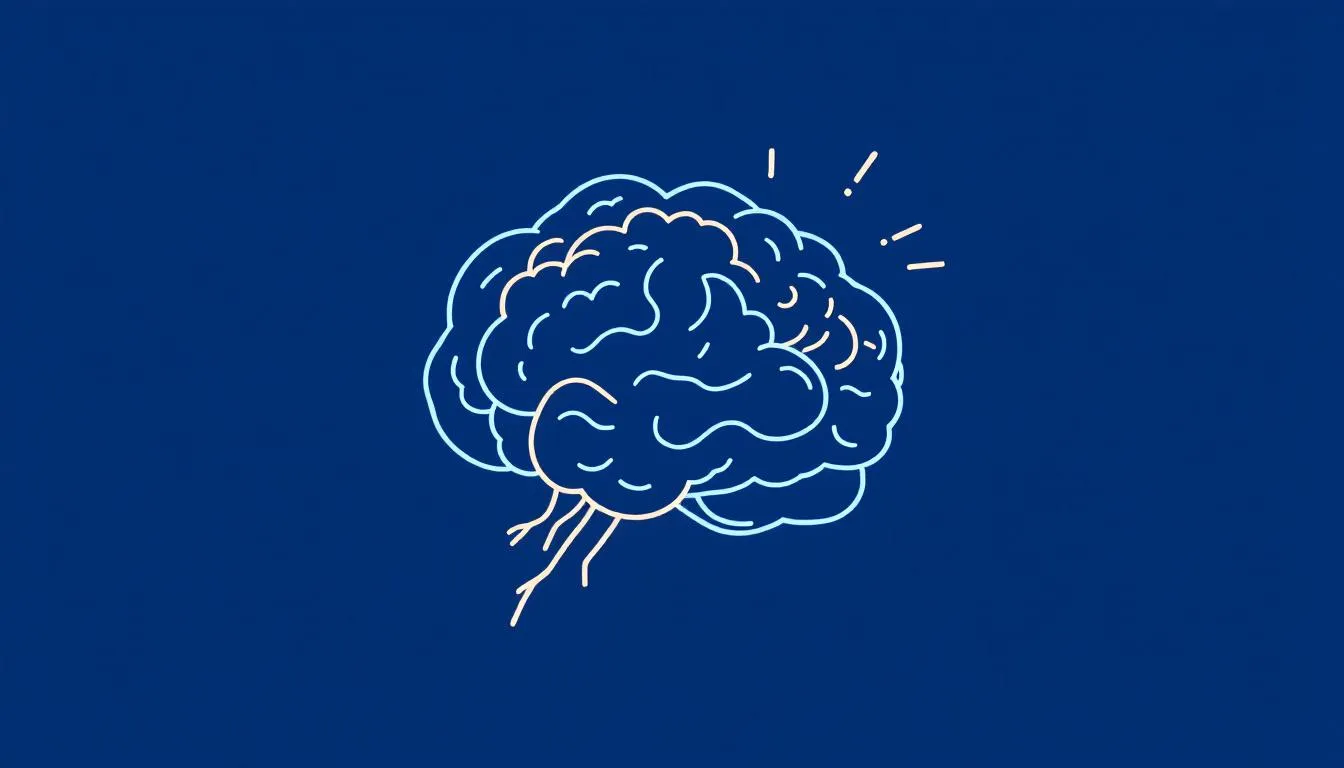Top Tips to Enhance Focus Under Stress

Are you finding it hard to stay focused under stress? Stress can make concentrating on tasks incredibly challenging. In this article, you’ll find actionable tips to help you maintain your focus under stress, even in high-pressure situations.
Key Takeaways
-
Stress hormones like cortisol can impair cognitive functions such as attention and problem-solving, making focus difficult during stressful situations.
-
Recognizing stress triggers, such as work pressure or life transitions, is essential for developing targeted strategies to manage stress and maintain clarity.
-
Practical strategies like deep breathing, breaking tasks into manageable steps, and effective time management can significantly enhance focus under stress.
The Science Behind Stress and Focus

Understanding the complex relationship between stress and focus starts with the brain. When we are stressed, our bodies release stress hormones like cortisol and adrenaline:
-
These hormones can provide a temporary boost in energy.
-
Their prolonged presence can severely impair cognitive functions such as attention and problem-solving.
-
High levels of cortisol are particularly notorious for causing attention deficits and slower processing speeds, making it hard to concentrate on tasks at hand.
Chronic stress can lead to structural changes in the brain, especially in areas like the hippocampus and the prefrontal cortex, which are critical for memory and emotional regulation. Extended exposure to elevated cortisol levels can even result in neuron loss, which further impairs memory and emotional control. Essentially, the very mechanisms designed to help us deal with short-term stress can lead to long-term cognitive decline if not managed properly.
The disruption caused by stress hormones doesn’t stop at cognitive abilities. During stressful situations, the surge in cortisol and adrenaline can initially increase energy but at the cost of impaired focus. This paradoxical effect can happen, making it challenging to stay focused and think clearly when you need it the most.
Understanding these biological underpinnings is crucial for developing effective strategies to manage stress and maintain focus.
How NAD+ Brain Supports Mental Clarity Under Stress
This is where NAD+ Brain comes in. It’s designed to support the brain’s resilience under stress by:
-
Protecting NAD+ levels in the brain — crucial for cellular energy production, neurotransmitter balance, and mitochondrial function.
-
Combining nootropics and adaptogens like Citicoline, Phosphatidylserine, and L-Theanine to help calm the mind while keeping it sharp.
-
Supporting dopamine and acetylcholine pathways to improve focus and motivation, especially under pressure.
-
Including Fisetin and Apigenin, two powerful plant compounds shown to reduce brain inflammation and support long-term cognitive health.
Think of it like a daily buffer that helps your brain stay focused, even when cortisol is trying to pull your attention in ten different directions.
Whether you’re in a high-stress job, juggling multiple projects, or simply want to feel sharper and more mentally agile — NAD+ Brain is designed to support the very systems that stress tends to wear down.
Recognising Stress Triggers
Before you can effectively manage stress, it’s essential to recognize what triggers it. Stress is the body’s response to challenging situations and demands. It can also be triggered by significant events or changes. Common stressors can arise from various sources, including:
-
Work pressure
-
Financial burdens
-
Relationships
-
Traumatic events, each of these can significantly impact your emotional well-being and ability to focus.
Life transitions, such as divorce or job loss, are particularly challenging stressors. These major changes can disrupt your mental equilibrium and lead to prolonged stress and depression. Similarly, caring for elderly or sick family members can create added pressure, making it difficult to concentrate on other aspects of life. Social isolation also contributes to stress, often leading to decreased mental health and disrupted concentration.
Recognizing these triggers is the first step towards managing them. Identifying what makes you stressed allows you to develop targeted strategies to reduce their impact. This awareness not only helps in managing stress but also in understanding how these stressors affect your mental clarity and focus.
Practical Strategies to Improve Focus During Stress

Once you’ve identified your stress triggers, the next step is to implement practical strategies to improve your focus despite the stress. There are numerous ways to manage stress and enhance concentration, ranging from deep breathing exercises to time management skills. These strategies aim to provide both immediate relief and long-term benefits.
Deep breathing techniques, breaking tasks into manageable steps, and effective time management are some of the most effective methods to stay focused under stress. Let’s dive into each of these strategies and explore how they can help you maintain your concentration even in the most stressful situations.
1. Deep Breathing Techniques
Deep breathing exercises are a powerful tool to calm the mind and relieve stress. Practicing deep breathing significantly reduces stress hormones in your body and improves your focus. The process involves:
-
Finding a quiet space
-
Inhaling deeply through your nose
-
Holding the breath for a moment
-
Exhaling slowly through your mouth
This simple yet effective technique can reorient your mind to a state of calmness, alleviating anxiety and enhancing your ability to concentrate, even when you feel anxious and in a positive mood. The benefit of this approach is significant, especially when concentrating on your tasks and research, allowing you to shift your focus and teach effectively.
Incorporating deep breathing into your daily routine can make a significant difference, particularly during challenging situations. Regular practice can help you remain calm and focused, providing a reliable way to manage stress whenever it arises. Take a moment to breathe and center yourself.
2. Break Tasks into Manageable Steps
Breaking tasks into smaller, manageable steps is another effective strategy to maintain focus under stress. When faced with a large, daunting task, it can be overwhelming and lead to procrastination. Dividing the task into smaller, achievable parts helps prioritize your work and reduces feelings of overwhelm. Techniques such as creating checklists or using project management tools can aid in this process.
Setting clear, achievable goals for each step can enhance your motivation and help you stay focused. This positive approach not only improves your focus but also contributes to reducing your overall stress levels.
Remember, tackling a large task is like a jigsaw puzzle; one piece at a time helps you cope with it and makes it manageable, even when dealing with large amounts of work. For example, a person can talk about how to solve it by breaking it down into smaller steps, which can help you keep your head in the process easier.
3. Time Management Skills
Effective time management is crucial for maintaining focus and productivity. Techniques like the Pomodoro Technique, which involves working in focused bursts typically 25 minutes long followed by short breaks, can significantly enhance your productivity. This method helps you maintain concentration and prevents burnout by aligning tasks with your peak focus times.
Implementing these time management strategies can help you manage your workload more efficiently, reducing stress and improving your overall focus. Ensuring enough time to complete each task helps maintain a sense of control and keeps stress at bay.
Physical Activity and Brain Health

Engaging in regular physical activity is one of the most effective ways to enhance brain function and relieve stress. Exercise not only benefits your body but also has profound effects on your mental health. Regular physical activity can relieve symptoms of anxiety and improve focus. It helps enhance cognitive skills such as thinking and problem-solving, making it easier to concentrate on tasks at hand.
Active individuals have a lower risk of experiencing cognitive decline compared to those who are inactive. Regular exercise is associated with improved memory function and overall mental health, making it an essential component of a healthy lifestyle.
Incorporating physical activity into your routine significantly enhances brain function and maintains focus even in stressful situations.
The Role of Nutrition in Managing Stress

Nutrition plays a vital role in managing stress and maintaining optimal brain function. A balanced diet provides the necessary nutrients that your brain needs to function at its best. During stressful periods, your body demands more energy and nutrients, so maintaining a nutritious diet becomes crucial.
Foods rich in omega-3 fatty acids and vegetables can help regulate stress hormone levels, contributing to a healthier mental state. A balanced diet supports a healthy immune system, which is essential for recovery from stress and maintaining overall well-being.
Including a variety of vitamins, nutrients, and minerals in your diet significantly benefits your ability to manage stress and stay focused, including vitamin d.
The Importance of Sleep for Focus

Quality sleep is essential for maintaining focus and cognitive function. Sleep plays a critical role in forming and maintaining the neural pathways necessary for learning and memory. It also helps clear toxins from the brain that accumulate during wakefulness, ensuring optimal brain function.
Insufficient sleep can hinder your ability to concentrate and respond quickly to stimuli. A consistent sleep schedule significantly improves sleep quality and overall focus.
Most adults require between 7 to 9 hours of sleep each night to function optimally, highlighting the importance of a good night’s sleep for maintaining focus and mental clarity.
Mindfulness and Meditation Practices
Mindfulness and meditation practices are powerful tools for managing stress and enhancing focus. Meditation can significantly improve attention and concentration, making it easier to stay focused during stressful situations. Mindfulness exercises, such as focusing on your breathing or performing a body scan, can help alleviate stress and anxiety.
Structured mindfulness practices, including sitting meditation, walking meditation, and sensory awareness activities, offer various ways to incorporate mindfulness into your daily routine. Mindful eating practices can also reduce stress-related eating by encouraging more thoughtful food choices.
Regularly engaging in mindfulness and meditation calms your mind, reduces stress, and improves your focus.
How NAD+ Brain Supports Focus Under Stress
When under stress, the brain demands higher energy and resilience to maintain focus, yet stress often leads to a depletion of essential molecules like NAD+, which are crucial for cognitive function. NMN Bio's NAD+ Brain is uniquely formulated to address this challenge by helping retain NAD+ within the brain—rather than generating more, it prevents NAD+ leakage, ensuring sustained cellular energy where it's needed most. This supports neuroprotection, mitochondrial health, and cognitive clarity. By keeping NAD+ levels stable in the brain, NAD+ Brain helps maintain attention, mental stamina, and memory even in high-pressure situations, making it an effective companion for those looking to stay sharp under stress.
Seeking Professional Help
Sometimes, managing stress on your own might not be enough, and seeking professional help becomes necessary. To consult a healthcare provider can help you discover personalized methods to manage anxiety and stress. Discussing stress management options with your healthcare provider ensures that you find strategies that work best for you.
Behavioral therapies, such as cognitive-behavioral therapy, are proven effective for treating anxiety disorders. Psychologists can guide you in identifying and modifying thought patterns that contribute to anxiety, providing a structured approach to managing stress.
Group therapy can also offer support and effective treatment options by connecting you with others facing similar challenges.
Summary
Managing stress and maintaining focus is a multifaceted challenge that requires a holistic approach. By understanding the science behind stress and focus, recognizing stress triggers, and implementing practical strategies, you can significantly improve your ability to concentrate even in stressful situations. Incorporating physical activity, proper nutrition, quality sleep, mindfulness practices, and considering supplements like NAD+ Brain can further enhance your cognitive health.
Remember, seeking professional help is always an option if managing stress becomes overwhelming. By taking proactive steps, you can transform stress into a manageable aspect of your life, ensuring you stay focused and productive. Embrace these strategies and take control of your mental well-being today.
Frequently Asked Questions
How does stress biologically affect focus?
Stress significantly impairs focus by releasing hormones like cortisol and adrenaline, which disrupt cognitive functions such as attention and problem-solving. Managing stress is essential for maintaining mental clarity and concentration.
What are common stress triggers?
Common stress triggers often stem from work pressure, financial issues, relationship challenges, and significant life changes such as divorce or job loss. Recognizing these factors can be crucial for managing stress effectively.
How can deep breathing exercises improve focus?
Deep breathing exercises significantly improve focus by calming the mind and reducing stress hormones, which helps you achieve a more centered and attentive state. Incorporating these practices into your routine can enhance your overall concentration and productivity.
What role does nutrition play in managing stress?
Nutrition plays a crucial role in managing stress as a balanced diet supplies essential nutrients that support brain function, regulate stress hormones, and boost the immune system. By prioritizing a healthy diet, you can enhance your resilience to stress.
Why is professional help important for managing stress?
Professional help is crucial for managing stress as it offers tailored strategies and evidence-based treatments, such as cognitive-behavioral therapy, that effectively address individual needs. Engaging with a professional can lead to significant improvements in your mental well-being.
Researched and reviewed by Dr Elena Seranova, Ph.D.
Dr Seranova holds a master's degree in Translational Neuroscience from the University of Sheffield, UK, and a Ph.D in Stem Cell Biology and Autophagy from the University of Birmingham, UK. She is a published author in multiple peer-reviewed journals, including Cell Reports and Developmental Cell.
LEARN MORE!






Leave a comment